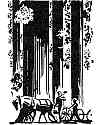 The life of a nation is not measured in a few hundred years and if
we get impatient we should go out to the West Coast and take a look at
the giant Sequoias. We are told some of those trees were about 200
years old when Christ was born. They are, as far as is known, the
oldest living things on Earth and have been growing continuously for
over 2,000 years! Now if we take the "Sequoia" or long range viewpoint
of a nation's development the years of real growth, the years in which
America will attain its greater magnitude must lie ahead.
The life of a nation is not measured in a few hundred years and if
we get impatient we should go out to the West Coast and take a look at
the giant Sequoias. We are told some of those trees were about 200
years old when Christ was born. They are, as far as is known, the
oldest living things on Earth and have been growing continuously for
over 2,000 years! Now if we take the "Sequoia" or long range viewpoint
of a nation's development the years of real growth, the years in which
America will attain its greater magnitude must lie ahead. Men such as Whitney, Revere and Terry have given us our first industrial roots and since then American growth has been accelerated by thousands of men who have contributed countless inventions and ideas of all kinds. The Future will see a great expansion of this process if we will always keep in mind that the Tree of American Progress is still far from maturity. ● |








